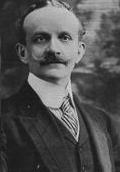Johann Heinrich von Bernstorff
From Kaiserreich
Johann Heinrich, Count von Bernstorff (born in London, United Kingdom, on November, 14 1862) is a German diplomat and current German State Secretary for Interior since 1934.
Contents |
Biography
Born in the famous and influent Bernstorff family, of Danish and German descent, Johann Heinrich von Bernstorff lived most of his youth in London, where his father was German ambassador under Bismarck. Following the same career that most of his ancestors had followed, he represented Germany in various missions accross Europe and Middle East, he tried to defuse the Tangier Crisis in 1906. Two years later, he was named ambassador to the United States.
Called home on July, 7 1914, during the beginnings of the future Weltkrieg, he returned there in August, 2, cooperating with then US President Woodrow Wilson to avoid an American intervention in the Weltkrieg, despite the various anti-German crisis that occurred during the war, such as the RMS Lusitania crisis in 1915 (then a British luxury ocean liner was stopped by German submarines in the war zone around British isles, avoiding only just a torpedoing) or the Annie Larsen gun running plot the same year (a case of arms trafficking destined to Hindu independantists supported by Germany. But Bernstroff's effort were conclusive, as the USA never entered the Weltkrieg, despite Wilson's well-known desires of an entry on the sides of Allies; his efforts also proved the uselessness of the unrestricted submarine warfare, thus helping the overthrow of the Hindenburg-Ludendorff dictatorship.
Recalled from United States in 1919, after the fall of France (now that Britain was alone against Germany, the Staff concluded that there was no need to handle carefully the United States), Bernstroff served in Constantinople during the rest of the Weltkrieg, not following the protests of his predecessor, count Paul Metternich, about the ill-treatments against Armenian people, but advocating for a Jewish State in Palestine. Refusing various times the office of State Secretary for Foreign Affairs, he enhanced relations with the British government in exile in Canada from 1926 to 1931, and represented Germany to the useless 1933 Strasbourg international conference about disarmament. In 1934, he accepted from his former attaché at Washington, current Reichskanzler Franz von Papen, the post of State Secretary for Interior in Germany, assuming only a representative role, most of his actions being made by his advisor, general Kurt von Schleicher.
Political career
- Diplomatic missions to Constantinople, Belgrade, Saint Petersburg, Munich, Cairo
- Embassy Councillor to London, United Kingdom (1902-1906)
- German ambassador to Washington D.C., United States (1908-1919)
- German ambassador to Constantinople, Ottoman Empire (1919-1922)
- German ambassador to Ottowa, Canada (1926-1931)
- German delegate to Strasbourg international conference about disarmament (1933)
- State Secretary for Interior (1934-...)
Is there a Bernstroff connection?
When Franz von Papen became Reichskanzler in 1934, some experts spoke of a "Bernstorff connection", presuming that the career of von Papen in German politics was helped by his service as military attaché to the German embassy at Washington D.C., and later by the relations of his former superior, Johann von Bernstorff, who received the ministry of Interior as a thank you. This theory is reinforced by the brilliant careers of Karl Boy-Ed (1872-1930), former naval attaché to the embassy and later Tirpitz's éminence grise and Heinrich Albert (born in 1874), succesful lawyer and businessman, and also former commercial attaché to the embassy.
Some American organizations are also claiming that Bernstorff's short return to Germany in 1914 was an opportunity to him to receive some instructions, in order to put in place operations of sabotage against American industry and transportation. Thus, the United States, who were seen as a potential member of the Entente, could be seriously in trouble if they were attacking Germany, and the neutral country could be used as a trade area, to supply the potential allies of German secret services, such as the Indian independantists. Thus, these American protesters are claiming that they were plans to destroy the Welland Canal, near the Niagara Falls, and that the blow up of the Roebling Wire and Cable plant in Trenton, New Jersey, in 1915, and the Black Tom explosion the next year were planned by Bernstorff's services, despite the constant official denies. These groups are claiming both Bernstorff's dismissal from his post of State Secretary and a trial held in the United States to put the light over these allegations.
Writings
- Deutschland und Amerika. Erinnerungen aus dem fünfjährigen Kriege, Berlin 1920.
- Erinnerungen und Briefe, Berlin 1936.

